Boston Museum (theatre)
The Boston Museum (1841–1903), also called the Boston Museum and Gallery of Fine Arts, was a theatre, wax museum, natural history museum, zoo, and art museum in 19th-century Boston, Massachusetts. Moses Kimball established the enterprise in 1841.[2]
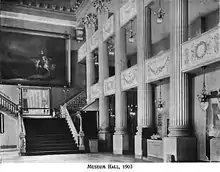
History
The Boston Museum exhibited items acquired from Ethan Allen Greenwood's former New England Museum; tableaux of wax figures; live animals; and artworks by John Singleton Copley, Gilbert Stuart, Benjamin West, Thomas Badger and others.[3] Early live shows presented, for instance, "the musical olio, consisting of solos on glass bells, and birch-bark whistling."[4] Theatrical performances began in 1843. Through the years, notable performers included: Lawrence Barrett, Edwin Booth, John Wilkes Booth, Madge Lessing, Richard Mansfield, E.H. Sothern, Mary Ann Vincent, and William Warren.
An advertisement of 1850 described the museum's key attractions:
"The museum is the largest, most valuable, and best arranged in the United States. It comprises no less than seven different museums, to which has been added the present year, besides the constant daily accumulation of articles, one half of the celebrated Peale's Philadelphia Museum, swelling the already immense collection to upwards of half a million articles, the greatest amount of objects of interest to be found together at any one place in America; and an entirely new hall of wax statuary.... and the immense collection of birds, beasts, fish, insects and reptiles;... paintings, engravings and statuary; ... Egyptian mummies, ... family of Peruvian mummies; the duck-billed platypus;... the curious half-fish, half-human Fejee Mermaid;... elephants and ourang-outangs..."[5]
The Museum held a recruiting office for Company D. of the 22nd Massachusetts Volunteer Infantry in 1861 at the start of the Civil War.
Architecture
Hammatt Billings designed the original museum building, located at 18 Tremont Street;[6] In 1846 Hammatt and J.E. Billings also designed the museum's next building, at 28 Tremont Street,[7][8] located next door to the Massachusetts Historical Society, and close to the King's Chapel Burying Ground.[9] The interior of the museum's 1846 building featured decoration by Ignaz Gaugengigl.[10]
[The building] is arranged in two main portions with an area between for light and air, one communicating with the other at either end by a wide passage. The building upon Tremont Street, the front of which is of Granite in a chaste and beautiful style of Venetian Architecture, with three spacious balconies running the entire length of the building, contains on the first story, five commodious stores, and the entrance to the Museum. Above this story, the whole front building to the eaves, three stories, is occupied as a grand Corinthian Hall... containing the collection. The galleries... are supported by twenty stately columns rising from the floor.... A spacious staircase and passage-way leads to the Exhibition Hall in the rear building... capable of accommodating nearly two thousand persons."[11]
Images
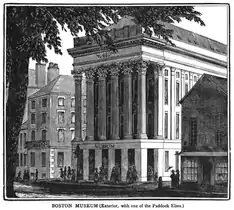 Boston Museum, no.18 Tremont St., Boston, 1841-1846
Boston Museum, no.18 Tremont St., Boston, 1841-1846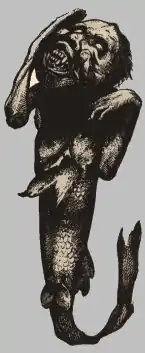 Feejee Mermaid, 1842
Feejee Mermaid, 1842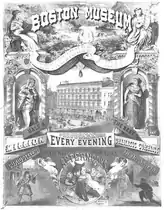 Advertisement for the Boston Museum, 19th century
Advertisement for the Boston Museum, 19th century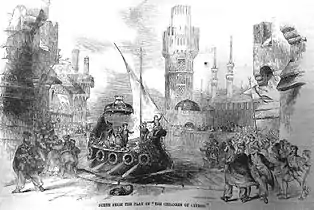 The Children of Cyprus; 1851 production
The Children of Cyprus; 1851 production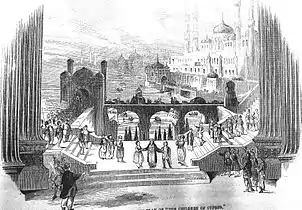 The Children of Cyprus (final act); 1851 production
The Children of Cyprus (final act); 1851 production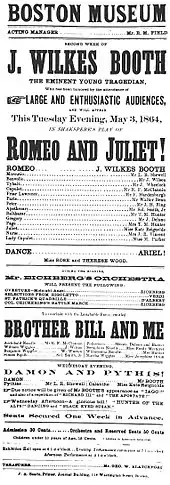 Playbill, 1864
Playbill, 1864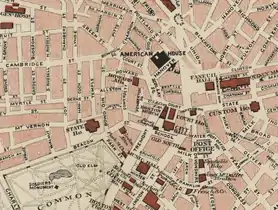 Detail of 1883 map of Boston, showing location of the Boston Museum
Detail of 1883 map of Boston, showing location of the Boston Museum Junius Brutus Booth and Edwin Booth, 19th century
Junius Brutus Booth and Edwin Booth, 19th century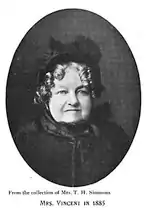 Mrs. Vincent, 1885
Mrs. Vincent, 1885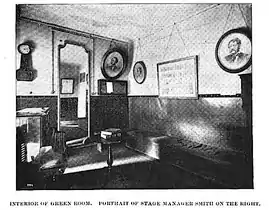 Green room, 1894
Green room, 1894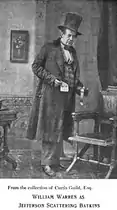 William Warren, 1903
William Warren, 1903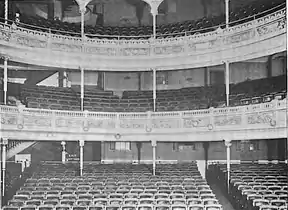 Theatre interior, ca.1903
Theatre interior, ca.1903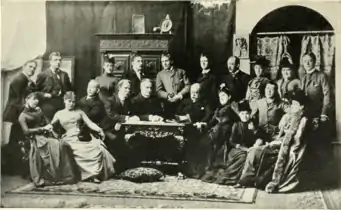 Boston Museum Stock Company, 1889-1890
Boston Museum Stock Company, 1889-1890
Selected shows
|
|
|
Selected performers
|
|
|
References
- MFA Collections
- Jim Vrabel, Thomas O'Connor, Bostonian Society. When in Boston: A Time Line & Almanac. UPNE, 2004.
- Jane Holtz Kay. Lost Boston. p.160-161. Includes illustrations.
- Kate Ryan. Old Boston Museum days. Boston, Little, Brown, 1915; p.3.
- Newspaper advertisement for the Boston Museum. The Barre Patriot. Barre, Vermont: 15 September 1850.
- Anthony Mitchell Sammarco, James Z. Kyprianos. Downtown Boston. Arcadia Publishing, 2002; p.43. Includes illustration.
- James F. O'Gorman. H. and J. E. Billings of Boston: From Classicism to the Picturesque. The Journal of the Society of Architectural Historians, Vol. 42, No. 1 (Mar., 1983), pp. 54-73. Includes illustrations.
- Bostonian Society, Philip Bergen. Old Boston in early photographs, 1850-1918: 174 prints from the collection of the Bostonian Society. Courier Dover Publications, 1990. Includes photo illustration of the museum.
- Thomas Boylston Adams. Here We Have Lived: The Houses of the Massachusetts Historical Society. Proceedings of the Massachusetts Historical Society, Third Series, Vol. 78 (1966).
- King's how to see Boston. 1895; p.83.
- Catalogue of the paintings, portraits, marble and plaster statuary, engravings & water color drawings, in the collection of the Boston Museum; together with a descriptive sketch of the institution, and general summary of the natural history specimens, curiosities, &c. Boston, 1847. Quoted in: O'Gorman. H. and J. E. Billings of Boston; p.58.
- "Star Scene". Gleason's Pictorial. Boston, Mass. 2. 1852.
- Bruce A. McConachie. H.J. Conway's Dramatization of Uncle Tom's Cabin: A Previously Unpublished Letter. Theatre Journal, Vol. 34, No. 2, Insurgency in American Theatre (May, 1982), pp. 149-154.
- "The Jewess". Gleason's Pictorial. Boston, Mass. 4. 1853.
- Mayhew, Edward; Smith, G. (1800). Make Your Wills! A Farce, in One Act (Acting ed.). New York, NY: Samuel French. p. 8. Retrieved 1 June 2017.
- Whiting, Lilian (24 September 1892). "The Beautiful Play "Agatha" by Isaac Henderson". The Inter Ocean. Retrieved 11 July 2017.
- Plays and players in Boston. New York Times, Feb. 14, 1892; p.13.
- Plays and players in Boston. New York Times, Feb. 14, 1892; p.13.
- Drama and music. Boston Globe, Dec. 19, 1893.
- "Nebraska State Journal". 1894.
Further reading
- Published in the 19th century
- Boston Museum. Boston Evening Transcript, Sept. 2, 1843.
- Rhyming catalogue of the rare, curious and valuable collection of curiosities, and works of art; in the Boston Museum. Boston Museum, 1848.
- Tom Pop's First Visit to the Boston Museum. Boston : Printed for the Publisher, 1848.
- Catalogue of the paintings, portraits, marble and plaster statuary, engravings and water color drawings: in the collection of the Boston Museum, together with a descriptive sketch of the institution, and general summary of the natural history specimens, curiosities, etc. Boston: Marden, 1849.
- Boston Museum. Boston Evening Transcript, May 29, 1850.
- Boston Sights and Strangers' Guide. 1856.
- King's Dictionary of Boston. 1883.
- The oldest theatre now in Boston. The Bostonian. Nov. 1894.
- Published in the 20th century
- Clapp. "The great dramatic quinquennium and The Boston Museum." Reminiscences of a dramatic critic. Houghton, Mifflin and Company, 1902. Internet Archive
- Howard Ticknor. The Passing of the Boston Museum. The New England Magazine 26. June 1903.
- Claire McGlinchee. The first decade of the Boston Museum. Boston, B. Humphries, 1940.
- Mammen, Edward William, The Old Stock Company School of Acting; a Study of the Boston Museum. Boston, Mass. : Trustees of the Public Library, 1945.
- Weldon B. Durham, ed. American theatre companies 1749-1887. Greenwood, 1986.
- Bloomfield, Zachary Stewart. Baptism of a "Deacon's" theatre: audience development at the Boston Museum, 1841-1861 (dissertation). University of Missouri; 1991.
- Andrea Stulman Dennett. Weird and wonderful: the dime museum in America. New York University Press. 1997.
- Published in the 21st century
- Peter DeMarco. A museum of the world, and the weird on Tremont St. Boston Globe, May 23, 2004. p. 6.
External links
| Wikimedia Commons has media related to Boston Museum. |
- WorldCat. Boston Museum (1847-1903)
- Boston Athenaeum. Theatre history.
- Yale University Library. Last nights but two of the engagement of Mrs. Barrett.